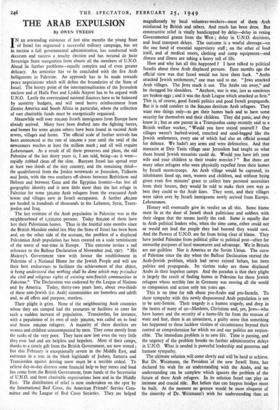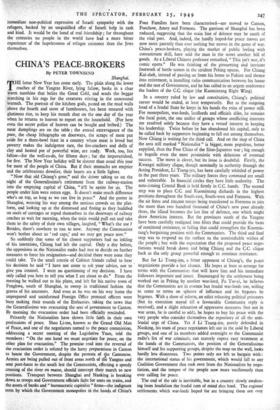THE ARAB EXPULSION
By OWEN TWEEDY
Ian astounding existence of just nine months the young State 1 of Israel has organised a successful military campaign, has set in motion a full governmental administration, has conducted with decorum and success a touchy election and has secured de facto Sovereign State recognition from almost all the members of U.N.O. Ahead lie further problems—equally complex and of even greater delicacy. An armistice has to be concluded with the five Arab belligerents in Palestine. An approach has to be made towards peace negotiations which will define the boundaries of the State of Israel. The knotty point of the internationalisation of the Jerusalem enclave and of Haifa Port and Lydda Airport has to be argued with
U.N.O. Lastly the overstrained national finances have to be balanced by austerity budgets, and will need heavy reinforcement from Zionist America and South Africa in particular, where the collection of vast charitable funds must be energetically organised.
Meanwhile well over roo,000 Israeli immigrants from Europe have already arrived. Many have been drafted into the fighting forces, and homes for some 40,000 others have been found in vacated Arab towns, villages and farms. The official scale of further arrivals has been announced at the rate of roo,000 a year until the total of the newcomers reaches at least the million mark ; and all will require Lebensraum. As a result of all these processes and plans, the old Palestine of the last thirty years is, I am told, being—as it were— rapidly rubbed clean off the slate. Buoyant Israel has spread over at least two thirds of the tiny country, and the remaining third— the quadrilateral from the Jordan westwards to Jerusalem, Tulkarm and Jenin, with the two southern off-shoots between Bethlehem and Hebron and between Gaza and the Egyptian frontier—has lost all geographic identity and is now little more than the last refuge in Palestine for some 320,000 Arab refugees from the evacuated Arab towns and villages now in Israeli occupation. A further 480,000 are herded in hundreds of thousands in the Lebanon, Syria, Trans- jordan and Iraq.
The last estimate of the Arab population in Palestine was in the
neighbourhood of 1,250,000 persons. Today 800,000 of them have lost their Palestinian homes. Thus in the fruitful nine months since the British Mandate ended last May the State of Israel has been born and, on the other side of the account, the problem of a displaced Palestinian Arab population has been created on a scale reminiscent of the worst of war-time in Europe. This outcome invites a sad reference to the Balfour Declaration of November 2nd, 1917. " His Majesty's Government view with favour the establishment in Palestine of a National Home for the Jewish People and will use their best endeavours to facilitate the achievement of that object, it being understood that nothing shall be done which may peiu di e the civil and religious rights of existing non-7ewish communities in Palestine." The Declaration was endorsed by the League of Nations and by America. Today, thirty-two years later, about two-thirds of these non-Jewish (i.e. Arab) communities are homeless and adrift and, to all effect and purpose, stateless.
Their plight is grim. None of the neighbouring Arab countries where they are camped had the resources or facilities to cater for such a sudden increase of population. Transjordan, for instance, with a population of its own of only 300s000, was called on to feed and house roo,000 refugees. A majority of these derelicts are women and children unaccompanied by men. They come mostly from the ranks of the very poor. They have now lost even the very little they ever had and are helpless and hopeless. Most of their camps, thanks to a timely gift from the British Government, are now tented ; but this February is exceptionally severe in the Middle East, and existence in a tent in the bleak highlands of Judaea, Samaria and Transjordan against driving snow must be a terrible ordeal. To relieve day-to-day distress some financial help to buy stores and food has come from the British Government, from funds of the Secretariat of U.N.O. and from charitable organisations here and in the Middle East. The distribution of relief is now undertaken on the spot by the International Red Cross, the American Friends' Service Com- mittee and the League of Red Cross Societies. They are helped magnificently by local volunteer-workers—most of them Arab reinforced by British and others. And much has been done. But constructive relief is vitally handicapped by delay—delay in voting Governmental grants from the West ; delay in U.N.O. decisions, and local transport delays. The outcome is a woeful shortage—on the one hand of essential supervisory staff ; on the other of food itself, and of medical stores, clothing and camp equipment—and disease and illness are taking a heavy toll of life.
How and why has all this happened ? I have talked to political Israelis about these Arab displaced persons. Four months ago the official view was that Israel would not have them back. " Arabs attacked Jewish settlements," one man said to me. " Jews attacked Arab villages. The Jews stuck it out. The Arabs ran away," and he shrugged his shoulders. " Anyhow, war is war, just as omelettes are broken eggs ; and it was the Arab League which attacked us first." This is, of course, good Israeli politics and good Israeli propaganda.
But it is cold comfort to the 800,000 destitute Arab refugees. They want two things only—to get their homes back and to have some security for themselves and their children. They did panic, and they know it ; but as one parent in a Transjordan camp recently said to a British welfare worker, " Would you have stayed yourself ? Our villages weren't barbed-wired, trenched and sand-bagged like the Jewish settlements, every one of which had also an official arsenal for defence. We hadn't any arms and were defenceless. And that massacre at Deir Yasin village near Jerusalem had taught us what those brutal Jewish terrorists could do. Would you have left your wife and your children to their tender mercies ? " But there are many other refugees who were physically expelled from their homes by Israeli storm-troops. An Arab village would be captured, its inhabitants lined up, men, women and children, and without being given even five minutes' grace to collect bare personal necessities from their houses, they would be told to make their own way as best they could to the Arab lines. They went, and their villages were taken over by Israeli immigrants newly arrived from Europe. Lebensraum.
History will eventually give its verdict on all this. Some blame must lie at the door of Israeli shock politicians and soldiers with their slogan that the means justify the end. Some is equally due to Arab political leaders who, when the time came, either could not or would not lead the people they had boasted they would save. And the Powers of U.N.O. are far from being clear of blame. They have jostled Palestine from political pillar to political post—often for unworthy purposes of local manoeuvre and advantage. We in Britain are not guiltless Nor is America or the Soviet Union. The curse of Palestine since the day when the Balfour Declaration started the Arab-Jewish problem, which had never existed before, has been politics and propaganda. Its victims today are those displaced Arabs in their hopeless camps. And the paradox is that their plight is largely the result of finding homes in Palestine for those Jewish refugees whose terrible fate in Germany was moving all the world to compassion and action only ten years ago.
This is no time for talk about pro-Arabs and pro-Israelis. To show sympathy with this newly dispossessed Arab population is not to be anti-Semite. Their tragedy is a human tragedy, and deep in the hearts of many of us—Moslems, Christians and, yes, Jews—who have homes and the security of a home-life far from the tension of want and fear, there is an uneasiness, a guilty sense that something has happened to these luckless victims of circumstance beyond their control or comprehension for which we and our politics are respon- sible. The immediate problem is to save life. Time is passing, and the urgency of the problem brooks no further administrative delays in U.N.O. What is needed is powerful leadership and generous and humane sympathy.
The ultimate solution will come slowly and will be hard to achieve. But Dr. Weizmann, the President 'of the new Israeli State, has declared his wish for an understanding with the Arabs, and no understanding can be complete which ignores the problem of the -future of these Arab refugees. In its solution Israel can play an intimate and crucial role. But before that can happen bridges must be built. At the moment no gesture would be more eloquent of the sincerity of Dr. Weizmann's wish for understanding than an immediate non-political expression of Israeli sympathy with the refugees, backed by an unqualified offer of Israeli help in cash and kind. It would be the hand of real friendship ; for throughout the centuries no people in the world have had a more bitter experience of the hopelessness of refugee existence than the Jews themselves.



































 Previous page
Previous page